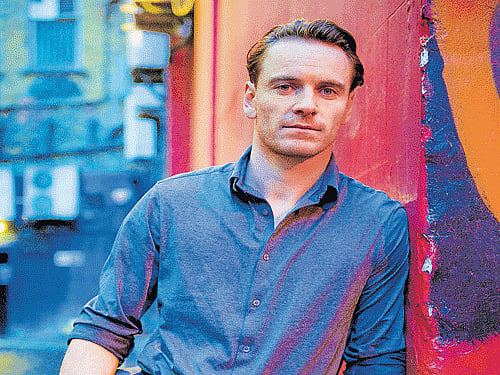
Michael Fassbender has played sex addicts, slave owners and supervillains. Could Macbeth be his baddest role yet? He concedes that the weather during the Macbeth shoot in Isle of Skye was on occasion “restrictive”. But for Fassbender, restrictive is good.
“Innovation comes through restriction,” he says. “And while on a big film you’ve got all the options in the world open to you, on a small film even getting it made is a hard thing. I love how fast you have to work — that pressure of having to get it right in one take or not at all.”
Whether the budget allows for one take or 50, Fassbender’s capacity for getting it right is now well known. It’s almost impossible to leave one of his films without feeling you’ve just seen one of the greatest actors of his generation swinging away at the coalface.
His first major screen role came in 2001, with a part in the HBO series Band of Brothers. But his real breakthrough came seven years later with Steve McQueen’s Bafta and Cannes-winning Hunger, in which Fassbender played the IRA hunger-striker Bobby Sands, and survived on water and seeds to lose more than two stones for the part.
He went on to star in two more films for McQueen, Shame and 12 Years a Slave, as well as playing the villainous Magneto in two X-Men films, the luxuriantly named Lt Archie Hicox in Quentin Tarantino’s Inglourious Basterds, David, the T E Lawrence-channelling android in Ridley Scott’s Prometheus, a thunderous Rochester in Cary Fukunaga’s Jane Eyre, and other unquiet souls.
Looming on the horizon, too, is his Steve Jobs biopic. Fassbender’s performance as the uncompromising Apple CEO was widely praised, and is expected to put him in serious contention for a best actor Oscar next year. Fassbender does his best work alone, at the edge of the world, and never more than a few footsteps from tragedy.
Which brings us back, of course, to Macbeth. Fassbender admits he’d never previously considered playing Shakespeare, either on stage or on film, until this particular opportunity reared its head. “I’m not the type to say, ‘I always wanted to play the Dane,’” he drawls.
He remembers studying Macbeth . He found Shakespeare’s words “alien… but it was no wonder, because we read it like a novel, and it’s supposed to be on its feet.” What changed his opinion? “I think every actor should do it once. And the opportunity to have a go is a great privilege.”
He joined the film in early 2013, and Justin Kurzel quickly followed as director. Fassbender loved Kurzel’s first film, the forbidding crime thriller Snowtown, and also his vision for the Macbeth character. The Australian filmmaker had imagined the ruthless Thane as a general suffering from post-traumatic stress disorder, literally haunted by his previous experiences on the field of battle.
Fassbender does not make things easy for himself: he’s known to spend weeks labouring over scripts, experimenting with nuance and inflection on every line, until he lands on the best possible way of delivering it.
Unsurprisingly, then, he’s a self-confessed “slow learner” when it comes to memorising dialogue. A recent spell on the set of Terrence Malick’s as-yet-untitled romantic drama was terrifying, he says: Malick “handed me 80 pages of script when I arrived on set on the Wednesday, and we were filming on the Friday”.
When films go wrong, they haunt him. When our conversation moves on to The Counsellor — a nihilistic, Cormac McCarthy-scripted thriller from Ridley Scott that got bad reviews. He got “a lot of things” wrong in his performance, he says, with a visible wince. “I love working with Ridley. But I just didn’t — I’m not happy with a lot of things I did.”
A recent source of considerable pride, though, is 12 Years a Slave, in which he played the depraved plantation owner Edwin Epps: a performance that earned him his first Oscar nomination last year, for Best Supporting Actor. He remembers calling McQueen after reading the script and “begging to be a part of it, whatever that part was — whether it was just a day or two on set”. Why hope for a role as contemptible as that? What was in it for him? “Somebody’s got to play the bad guy,” he says. “And somebody’s got to play the bad guy humanly. I like the idea that we’re all capable of great things and terrible things. We shouldn’t keep them at arm’s length.”
Perhaps that desire to see the best and worst of humanity up close is what made the teenage Fassbender consider a career in war journalism. But when he went to an acting workshop at the age of 17, he knew he’d found his niche.
After that came two thirds of an acting degree at Drama Centre London — and, following his big-break-that-wasn’t in Band of Brothers, six busy but mostly fruitless years on the Los Angeles audition circuit. Then in 2008, Hunger made him a star, and by October of that year, he was filming with Tarantino, in the country of his birth.
Next comes something of a Macbeth reunion. With Kurzel directing and Cotillard co-starring, he’ll appear in the forthcoming Assassin’s Creed blockbuster. I ask how he thinks he’ll adapt to the glamour of a Hollywood production after battling through hailstorms in the Hebridean wilds. His wolfish grin suddenly grows wider.
“Well,” he says, “we all need a release valve, you know?”